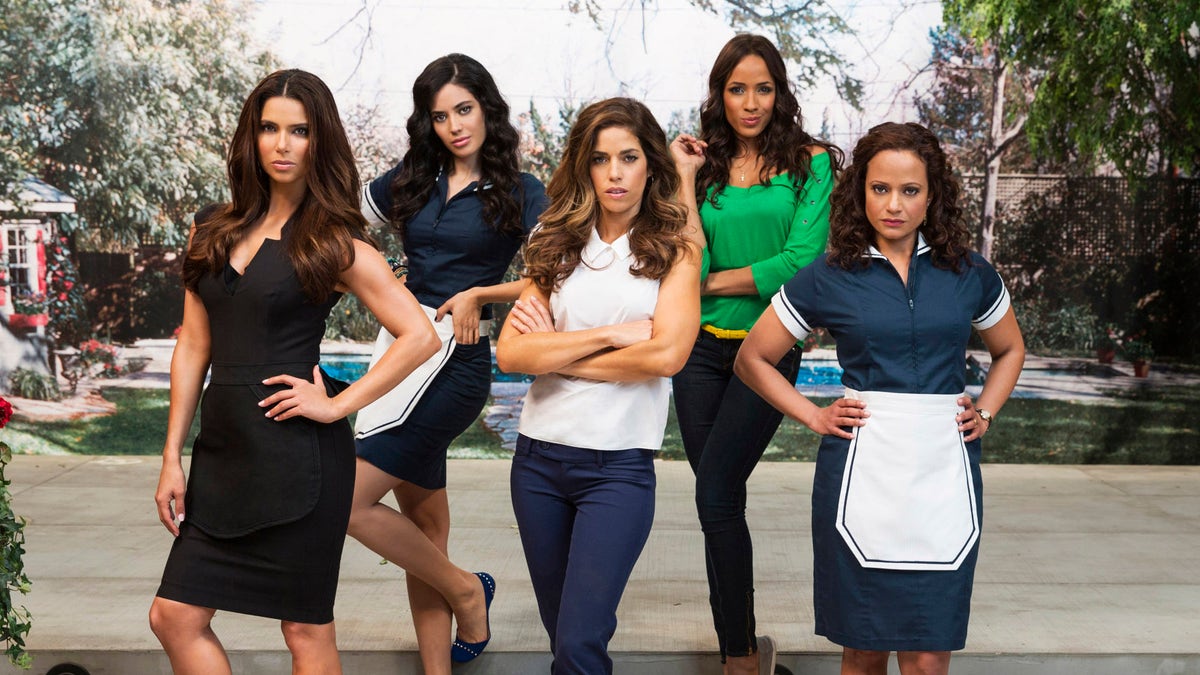
FILE - This undated file photo released by Lifetime Television shows, from left, Roselyn Sanchez, Edy Ganem, Ana Ortiz, Dania Ramirez and Judy Reyes who star in the new Lifetime series "Devious Maids." The series, about the lives of domestic workers and their wealthy bosses, was created by Marc Cherry, who also created the popular series, "Desperate Housewives." (AP Photo/Lifetime Television, Jim Fiscus, File)
Associated Press – While minority actors have made on-again, off-again progress through the years, advances on TV aren't the same among all groups seeking greater representation.
ABC, Fox and NBC can claim a higher percentage of blacks on scripted prime-time shows than there are in the general population, an Associated Press analysis of television diversity has found. But black characters outnumber Latinos on those networks as well as on CBS — despite there being more Latinos (17.1 percent, according to 2013 U.S. Census Bureau figures) than blacks (13.2 percent) in the United States.
"What I found over the years is that networks are so committed to developing diversity, but they're very, very scared about actually programming it," said Mexican-American actress Eva Longoria, the "Desperate Housewives" star who is producing "Devious Maids" for Lifetime and will star in the upcoming sitcom "Telenovela" for NBC.
"Devious Maids," with Latina leads, was created for ABC by Marc Cherry, mastermind of that network's "Desperate Housewives." It landed not on ABC but on cable instead.
When Fox and the now-defunct UPN started, they aired a handful of series with all-black casts in the hope of gaining a foothold with that audience before broadening their appeal. While many of those shows didn't survive, they introduced new talent to the industry.
For Latinos, there was no similar pipeline, said Adam Moore, SAG's national director of affirmative action. Moreover, outsiders have difficulty navigating differences within the Latino community; the experiences of people with different ancestry are markedly different. And while the CW's "Jane The Virgin" won its star, Gina Rodriguez, a Golden Globe, another freshman series that appeared to represent a breakthrough, the ABC comedy "Cristela" which centered on an ambitious Latina and her family life, was slammed by some critics as perpetuating stereotypes.
Asian-Americans, who make up 5.3 percent of the U.S. population, have fallen short with TV networks as well: Except for CBS, which matches that Census figure, the other networks' fall lineups included no more than 2.6 percent Asian-American characters.
Their status has improved since 1999, when the numbers fell as low as under 1 percent at two networks, and there is excitement about ABC's upcoming family comedy "Fresh Off the Boat," which stars a Taiwanese family, said Daniel Mayeda, co-chairman of the Asian Pacific American Media Coalition.
He remembers a time when the few Asians he saw on TV were delivering food (the family depicted on "Fresh Off the Boat" is also in the restaurant business — but they own the restaurant). A low point was Fox's short-lived melodrama "North Shore," which was set in Hawaii with only whites as its stars. When Mayeda asked a casting person why, he said, he was told the best person was hired for each part, and many of them had to appear in bikinis for beach scenes.
Mayeda was flummoxed.
"Asian-American women can get breast implants just as well as white women can," he observed. "It was astonishing."
Even more slighted: Native Americans and Alaska Natives, who the Census Bureau in 2013 put at about 1.2 percent of the population but who, year after year, are rarely seen on TV, said Sonny Skyhawk, an actor and founder of American Indians in Film and Television who's been tracking the issue since 1980.
His exchanges with industry members are routinely frustrating as well, he said.
"You're going to tell me that after thousands of programming hours, after thousands of roles, that you can't find one small role, whether a judge or a cabdriver or even a homeless person that could be a Native American?" he recalls asking.
"They give me the boilerplate: 'We're color blind, and skin and color and race doesn't make a difference' in casting," Skyhawk said.
Kweisi Mfume was head of the NAACP in 1999 when that organization joined other civil rights groups to step up the pressure on the networks to diversify casts. As Mfume sees it, the disparity between African-Americans and other minorities may have resulted in part from the NAACP's status as the nation's oldest and largest civil rights group, reinforced by an industry misconception that the issue was primarily a black one.
The nation's shifting demographics belie such simplicity while mounting a strong argument for serving a broad-based audience.
Alex Nogales, president and CEO of the National Hispanic Media Coalition, used to go into diversity meetings with network executives feeling mad, and come out even madder. But he's noticed an improvement over the past few years in television's attitude toward diversity.
"It's very little to do with good citizenship," he said. "They're not doing it because they love Mexicans so much. They're doing it because we're a good business proposition. I would rather they tell me that than tell me it's the right thing to do."





















